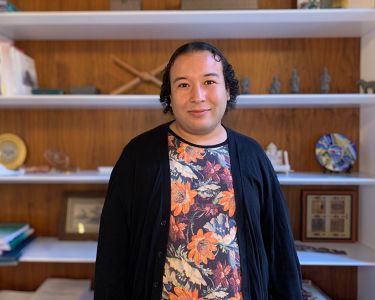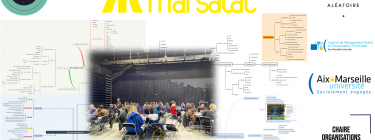
From crisis in systems to crisis of systems!
Edina Soldo, Full Professor at IMPGT-Aix-Marseille University School of Public Managment and Territorial Governance and Co-Leader of OTACC Chair; Djelloul Arezki, Senior Lecturer at IMPGT and Co-Leader ot OTAC Chair, Marseille
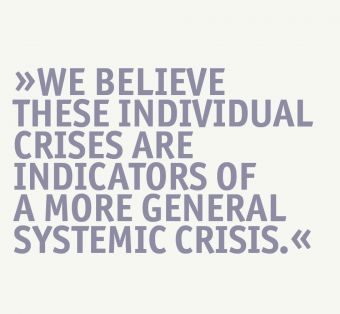
From crisis in systems to crisis of systems!
How can a new culture of research and research policy contribute to a post-covid world?
Since 2020 we witness not only multiple climatic, social, economic, and democratic crises, but a new interconnectedness of crises: We believe these individual crises are indicators of a more general systemic crisis. This piece debates and presents what an adaptation of the academic world in this system of crisis could look like, and what academic institutional innovation can contribute to overcome it. We believe organisational innovations are a prerequisite to re-build better and empower the makers of a possible Next Renaissance.
Picture above: Copyright: OTACC Chair
Interwined crises : telling points of a societal model system failure
„The climate, energy (and more generally natural resources), biodiversity, agricultural and food, demographic, social, financial, economic, democratic and governance crises… all indicate that our development model systemic crisis is now showing its limits… Could the Covid-19 crisis be the first one of a series of interconnected crises? (College of Societal Transitions1).
Because of their characteristics, the created problems and the generated effects, those intertwined crises deeply weaken our contemporary societies and are causes of worrying imbalances: social, demographic, economic, environmental, increasing inequalities, etc. These crises fundamentally question values and strategic priorities on which our societies’ development models are based. They also seriously challenge our capacity to lastingly
integrate populations with various backgrounds (social, ethnic, linguistic, cultural, religious, etc.).
Faced with the urgency of this situation, can stakeholders involved in public policies (researchers, public structures and organisations, experts and professionals) still work in nonintegrated way and vision? Are compartmentalised approaches still relevant and efficient?
Today these questions become even more acute because over the last few decades the normative, individualistic, and competitive approach, linked to the domination of a neoliberal capitalist development model, has largely delayed and slowed the emergence of collective utopian and pragmatic proposals and solutions.
To design a complex, holistic way of thinking, the challenge of a Renaissance is more urgent than it has ever been. “Building a live-together society” necessarily implies the emergence of an inclusive societal transition project.
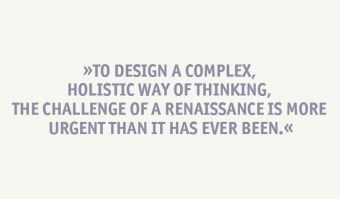
Integrated solutions: How can a university achieve a collective utopia?
Society is in need of an inclusive ecosystem in the Cultural and Creative Sectors and Industries (CCSI) in order to promote societal transition. The Organisations and Territories of the Arts, Culture and Creation (OTACC) Chair, led by the Public Management and Territorial Governance School, is a Training and Research Unit of Aix-Marseille University and could be viewed like a sandbox for the academic world proposing novel organisational answers to this wicked systemic crisis. To do so the OTACC Chair is designed with the following mission and especially tailored components and features:A Creative Industries sector in order to promote societal transitions.
The OTACC Chair mission is to operate as a laboratory for thinking, experimenting, and disseminating innovative management systems for artistic, cultural and creative projects.
OTACC: A participatory science programme to foster inclusive societal transition projects
« O » Organisations and inclusion: OTACC Chair supports CCI organisations to address the challenges of the 21st century: digitisation, new users’ practices, ecological transition, citizen participation. An inclusive environment with a wide variety of stakeholders can help to ensure the success of innovative artistic, cultural, and creative projects. As such, CCI organisations perform as a driving force for innovation, becoming a model for other sectors which can lead to cross-sectoral collaborations.« T » Territories and inclusion: CCI projects are deeply connected with territorial actors and resources contributing to a sustainable and local development and foster collaborative work practices. CCI projects are a strong part of territorial attractiveness. Its connections in all social, societal and economic dimensions can assume a real impact from those CCI projects. They act as civic laboratories by experimenting new democratic governance practices, encouraging citizen involvement and creating collective innovative dynamics.
« A » Arts and inclusion: Based on various disciplines and aesthetics, CCI projects reflect major social and societal transformations and are fully developed and designed with a transdisciplinary approach. Artistic works address citizenship issues and encourage expression of a broad range identities. By putting also into question standard thinking habits, artists extend societal and technological limits.
« C » Culture and inclusion: Because the Chair conceives Culture as a whole concept in its civilisational sense, its analysis and studies move beyond a basic approach of “cultural production”. It deals with all the parts of CCI value chain: from the creative act to its distribution. And all forms of cultural expression are considered, from the so-called mainstream to so-called subcultures. A plural and inclusive approach to culture is strongly advocated.
« C » Creation and inclusion: OTACC Chair supports cultural, creative, social, and solidarity-based entrepreneurship. OTACC Chair guides projects emergence and development through participatory research. Academics, professionals and students are all gathered in order to promote shared solutions and vision to the main issues of the CCI sector.
OTACC: 3 axes to foster and support inclusive societal transition projects
Chair scientific project is focusing on 3 axes: Training, Research and Development, and Events organisation.
AXIS 1. TRAINING
6 services/ actions
– MDOMC Master degree leading: “Direction of Cultural Projects or Establishments” (DPEC) Master degree and “Management and Law of Cultural Organisations and Events” (MDOMC) Master degree both provide to OTACC Chair a strong pedagogical expertise. Founded in 1998 and awarded by Eduniversal, MDOMC Master runs work-linked training courses. Junior executives, enrolled as apprentices, offer their expertise to all OTACC Chair members. This master’s degree, the oldest of IMPGT, has a large Alumni network. They are working in all types of CCI companies (local, national, and international).
– Incubator function: OTACC Chair operates as a cultural and creative, social, and solidarity-based entrepreneurial incubator. OTACC Chair Master students, throughout two years training, implement their elaborated inclusive CCI project.
– Serious game: as a last course, the serious game is conceived to put students in real professional situations. They have to submit a project proposal in response to a cultural operator order.
– Short training courses: from 1 to 5 days and open to all types of public, those training courses focus on cultural and creative industries management.
– Off-site training courses: customised thematic training courses are designed on request to fulfil the CCI sector professional operators requirements.
– Career development: skills assessment and professional support for CCI managers.
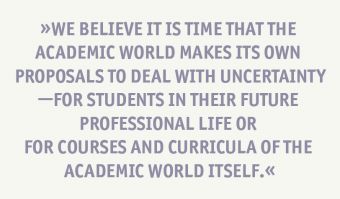
AXIS 2. RESEARCH AND DEVELOPMENT
4 services/ actions
– Worldwide watch of best and innovative inclusive practices in CCI
– Resources:Free Access to all OTACC Chair members studies and research
– „Experimental labs “ Evaluation: Evaluation and audit by OTACC Chair experts and students
– Research projects Leading/Participation/Coordination: proposals in respond to collaborative research projects calls (National, European and International fundings).
AXIS 3. FORUM PLACE
By offering a discussion, sharing and meeting forum, OTACC Chair gives an opportunity to Members to increase and improve visibility and audience. The Chair network allows members to know each other and gives possibilities of exchanging projects and experiences. 3 types of events including a major one are yearly scheduled
– „Journées Organisations et Territoires des Arts de la Culture et de la Création“ (OTACC Days): professional event supported by OTACC Chair and co-organised in partnership with Master’s students, Chair members and partner organisations.
– Throughout the year, physical and/or online thematic micro-events are planned
– Chair experts attending events organised by Chair members/partners.
OTACC Chair project : Anti-discrimination strategies in Evaluation
Every year, the Chair pilots two studies on inclusion topic: a „macro“ study analysing ICCs sector inclusion practices and a „micro“ action-research focusing on innovative inclusion systems.
The 2021 „micro“ study focuses on the anti-discrimination strategies evaluation of ICCs organisations current music sector. The Chair students were dispatched into evaluation teams supervised by the Chair experts. The teams have collaborated with contemporary music sector key operators producing „experimental laboratories“.
Picture right: Copyright: OTACC Chair
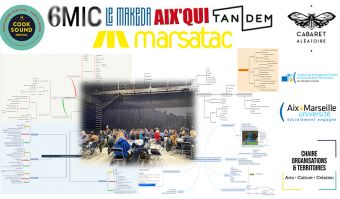
OTACC – a role model for a pluralistic fundamentally integrated organisation to teach innovative management to tackle crisis holistically.
Teaching management in a systemic crisis sounds on first sight like squaring the circle. We believe it is time that the academic world makes its own proposals to deal with uncertainty—for students in their future professional life or for courses and curricula of the academic world itself.
OTACC Chair, as a pluralistic fundamentally organisation and participatory science approach, brings together academic researchers, students, CCI sector professionals (public and private organisations representatives), artists, artists collectives, related sectors professionals (public and private organisations representatives) and offer them an non-linear learning environment with built-in cross-disciplinary surprises as well as the integrated skills for management in a world of multiple and continuing crisis.
References/Links
1 Collège des transitions sociétales: https://web.imt-atlantique.fr/x-de/cts-pdl/
OTACC presentation
Edina Soldo
Edina Soldo is Full Professor at IMPGT (Public Management and Territorial Governance School)-Aix-Marseille University (AMU) and AMU Special Advisor on CCI. Djelloul Arezki is Senior Lecturer. They are both researchers at the CERGAM, AMU research center and head “Management and Law of Cultural Organisations and Events” Master’s degree at IMPGT.They have founded with three major universities and the Provence Alpes Côte d’Azur Region a regional hub: MIN4CI, Mediterranean Innovative Narratives Competence Center for Cultural and Creative Industries.
Edina´s research topics focus on innovation in CCIs. She analyses inclusive approaches in co-developed CCI territorial projects by using Public management and strategic territorial management concepts and theories.
Picture © Gapore Tan

Djelloul Arezki
Djelloul Arezki´s research topics focus on inclusive practices in co-developed CCI organisational projects. He analyses inclusion through strategic human resource management and queer theory. They co-lead the OTACC Chair.
Picture © Gapore Tan
